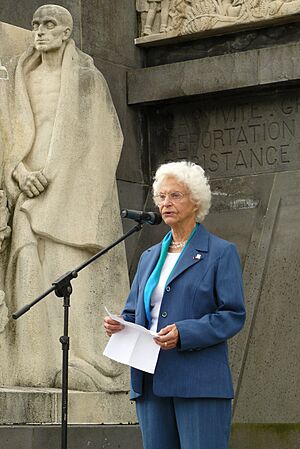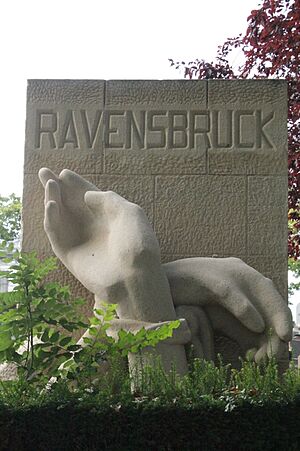Marie-José Chombart de Lauwe facts for kids
Quick facts for kids
Marie-José Chombart de Lauwe
|
|
|---|---|

Marie-José Chombart de Lauwe in 2007
|
|
| Born | 31 May 1923 Paris, France
|
| Died | 9 January 2024 (aged 100) Paris, France
|
| Nationality | French |
| Occupation | French resistance fighter, sociologist and human rights activist |
Marie-José Chombart de Lauwe (31 May 1923 – 9 January 2024) was a brave French resistance fighter during World War II. After the war, she became a sociologist, studying people and society. She also spent her life working to protect human rights.
During the war, she helped fight against the Nazi occupation of France. She was arrested in 1942 for her secret activities. She was sent to the Ravensbrück concentration camp. There, she was forced to work in a factory and later in the camp's nursery for babies, called the Kinderzimmer.
In 1945, she was rescued by the Swedish Red Cross. After the war, she returned to France and became an important voice for human rights and remembering the history of the war.
Contents
Early Life and Education
Marie-José was born in Paris, France, on May 31, 1923. Her mother, Suzanne, was a midwife, and her father, Adrien, was a children's doctor. Her father had been injured in the First World War.
She spent her childhood holidays on the island of Bréhat in Brittany. In 1936, her family moved there permanently. She was 12 years old and continued her schoolwork from home. During the early part of World War II, she was a high school student. On June 17, 1940, she heard the French leader, Philippe Pétain, announce that France would surrender to Germany.
Joining the French Resistance
At just 17 years old, Marie-José decided to join the French Resistance. This was a secret movement of people who fought against the German soldiers occupying their country.
In the summer of 1940, German soldiers arrived on her home island of Bréhat. Marie-José's family hid a radio behind a painting to listen to secret broadcasts from London. She, her mother, and her father all joined the Resistance. Marie-José worked as a messenger, carrying secret information. She knew it was very dangerous work.
In 1941, she started studying medicine at a university in Rennes. She had a special pass that allowed her to travel to the coast to visit her parents. She would hide important notes in her school notebooks and deliver them. She was part of a Resistance group that helped British pilots who had been shot down escape back to Great Britain. The group also sent information about German defenses to London.
The Resistance group was betrayed by a spy. On May 22, 1942, Marie-José was arrested. She quickly wrote a note for her family, saying, "I’ve been arrested. Inform family and friends." She was then put in prison, where she found out her parents and other members of her group had also been captured.
Sent to Ravensbrück
Marie-José was moved to different prisons and questioned by the Gestapo, the Nazi secret police. In one prison, she met other brave Resistance fighters.
She was eventually sentenced to death, but this was changed. Instead, she was sent to the Ravensbrück concentration camp in Germany. She was labeled an 'NN' prisoner, which stood for Nacht und Nebel (Night and Fog). This meant she was a political prisoner who was not allowed any contact with the outside world.
She arrived at the camp in July 1943 with her mother and 56 other French women. At Ravensbrück, she was given the prisoner number 21706 and forced to work in a factory owned by the company Siemens. Even in the terrible conditions of the camp, she and her friends secretly made small gifts for each other to keep their spirits up.
In February 1944, her father died in the Buchenwald concentration camp. She did not find out about his death until after the war.
Working in the Kinderzimmer
In the summer of 1944, Marie-José was forced to work in the Kinderzimmer, or children's room. This was a place where babies born in the camp were kept. The room was crowded, and there were not enough supplies like diapers or milk to care for them.
The women in the camp tried their best to help, but sadly, most of the babies did not survive. Marie-José also saw many other terrible things, including medical experiments performed on other prisoners. After the war, she bravely testified against the commander of the Ravensbrück camp, who was found guilty of crimes against humanity.
About her time in the Kinderzimmer, she said:
The two worst things I encountered in Ravensbrück were the ‘rabbits’, that's what we called the unfortunate women who were used in Nazi experiments, and the babies... I encountered the daily death of children and the despair of mothers. But it was my vocation: I had to save a few lives... It was a new resistance, but with so few results.
In March 1945, she was moved to the Mauthausen camp. On April 21, she and other prisoners were finally freed. They were taken to safety in Switzerland by the International Red Cross.
Life After the War
Marie-José returned to Paris on May 1, 1945. She went back to her home on the island of Bréhat to recover. She finished her medical studies and married Paul-Henry Chombart de Lauwe. Together, they had four children.
She became a sociologist and worked for the French National Centre for Scientific Research (CNRS). Her research focused on the well-being of women and children.
She remained an activist for her entire life. She was a member of the French League of Human Rights and became the president of the Foundation for the Memory of Deportation. This organization works to make sure that people never forget what happened during the war.
Awards and Honors
Marie-José received many awards for her bravery and her work.
- Grand-croix de la Légion d'honneur (Grand Cross of the Legion of Honour), France's highest award, in 2021.
- Médaille de la Résistance française (French Resistance Medal) in 1947.
 | William Lucy |
 | Charles Hayes |
 | Cleveland Robinson |


